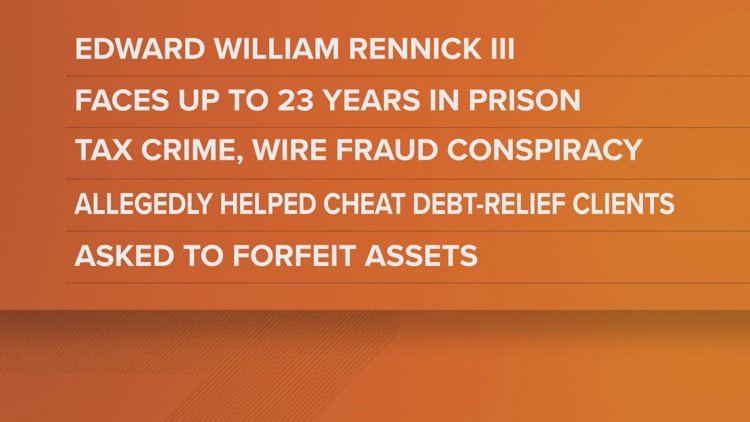Share this @internewscast.com

Edward William Rennick could face up to 23 years in prison if he’s convicted of a tax crime and wire fraud conspiracy for helping cheat debt relief clients.
JACKSONVILLE, Fla. — This story first appeared in the Florida Times-Union.
Already sued by the federal government over deceptive telemarketing, a Jacksonville-area businessman is facing a fraud charge involving what prosecutors described as a string of crooked debt-settlement businesses.
Edward William Rennick III, 51, could face up to 23 years in prison if he’s convicted of a tax crime and wire fraud conspiracy for helping cheat debt relief clients despite a 2016 court order barring him from selling debt relief services again.
The ban was part of a settlement for a lawsuit by the Federal Trade Commission, which also required Rennick and two businesses tied to him to pay a combined $8 million.
Despite that agreement, Rennick was involved in “illegitimate debt settlement and loan modification businesses that opened and closed under various names, oftentimes involving the same principals and personnel,” prosecutors argued in charges filed March 27 that listed a half-dozen firms operating between 2015 and 2024.
Prosecutors want Rennick to forfeit between $2 million and $2.6 million described as proceeds from fraud, as well as a 2018 Lexus, a bank account in one of the firm names and a cashier’s check.
Reached by phone Tuesday, a man who identified himself as Rennick said he wanted to consult his attorney before commenting.
One of the companies mentioned in Rennick’s case, Titan Legal Processing, told customers by email that “all of your money goes toward paying off your bills” and collected $24.5 million in payments from about 3,000 people, according to a plea agreement for fraud that prosecutors finalized last year with Edwin Bell Lay III, a reoccurring figure in the chain of companies.
The plea agreement said about $7.8 million really was used to pay customers’ bills or issue refunds for complaints, but “the rest of the money went to those running Titan.”
Lay’s plea said he received between $2.5 million and $3.5 million and passed an unspecified cut of that to “Individual 1,” the label prosecutors in Lay’s case used for the person who received the court order issued to Rennick in the FTC lawsuit
Lay is mentioned by name in Rennick’s case and his sentencing was delayed several months ago because attorneys told a judge he would be cooperating with the government on a complex fraud case.
Lay’s plea said Individual 1 was a silent partner in debt businesses after the FTC order, meaning his name didn’t appear on company paperwork but he still received payments for his role in the companies.
It said Individual 1 closed several companies and was then involved in replacement businesses that took over handling debt-settlement clients.
Individual 1 recruited Lay and other people to staff a new company called Volks Anwalt (German for “People’s Lawyer”) and told Lay he expected to receive $7,500 a month ― $90,000 a year ― from the new business, the plea agreement said.
Several debt businesses listed in Rennick’s case, such as Surety Law Group, Redstone Law Group and Ameritrust Law Group, carried names emphasizing law, although Rennick is not an attorney.
The March 27 court filing, called a superseding information, said Rennick was also a silent partner in Volks Anwalt, which the information said was marketed as a loan modification and debt settlement business and used a novice lawyer as its principal attorney.
The lawyer ended up asking the Florida Bar to have her law license revoked in 2019 to end eight separate complaints, according to Bar records that said the firm ran into trouble with local legal rules after parceling out work to attorneys around the country.
Most work at Volks Anwalt was done by paralegals with no attorney supervision, an attorney representing the novice lawyer told the Bar.
Another person mentioned in Rennick’s case only as “Individual 2” appeared to also be an attorney who was also involved in the FTC lawsuit and was also disbarred in 2019, according to Bar records.
Neither of the former attorneys has been charged with a crime.
Rennick was also charged with filing a false 2020 tax return that understated his income.
No date has been set for Rennick’s next court appearance.

















